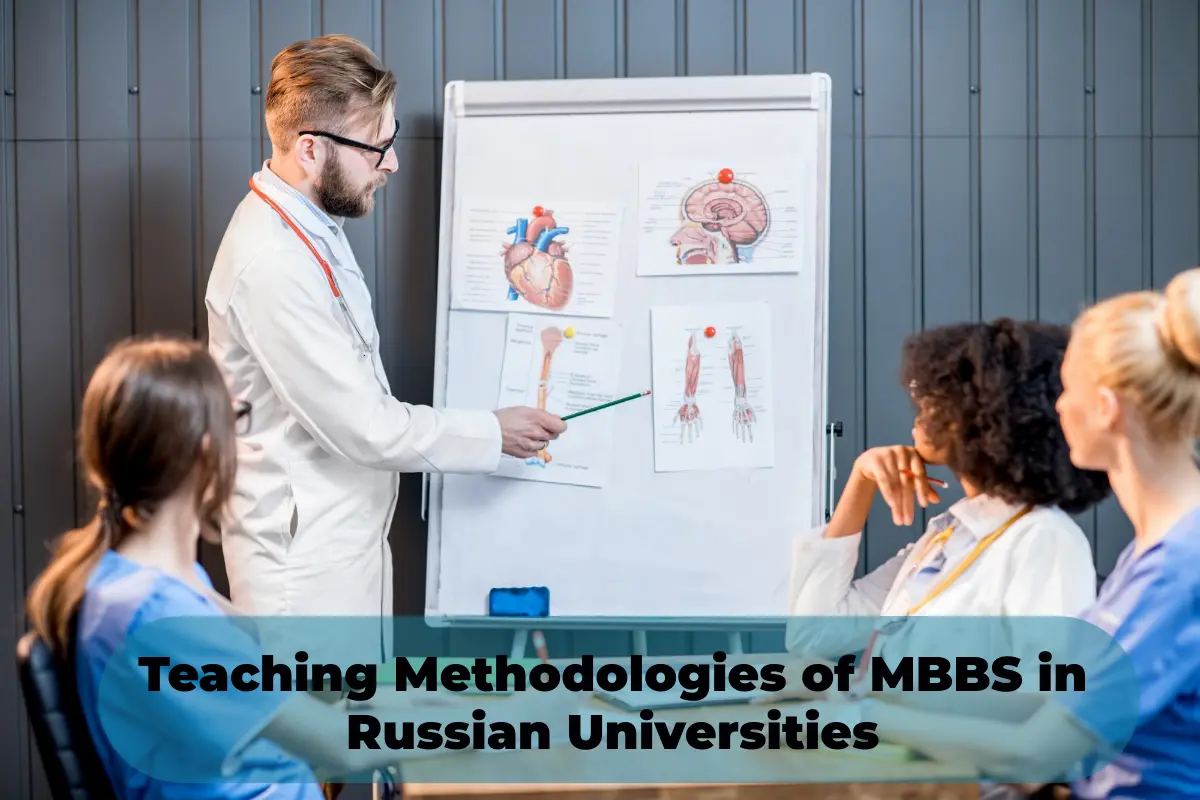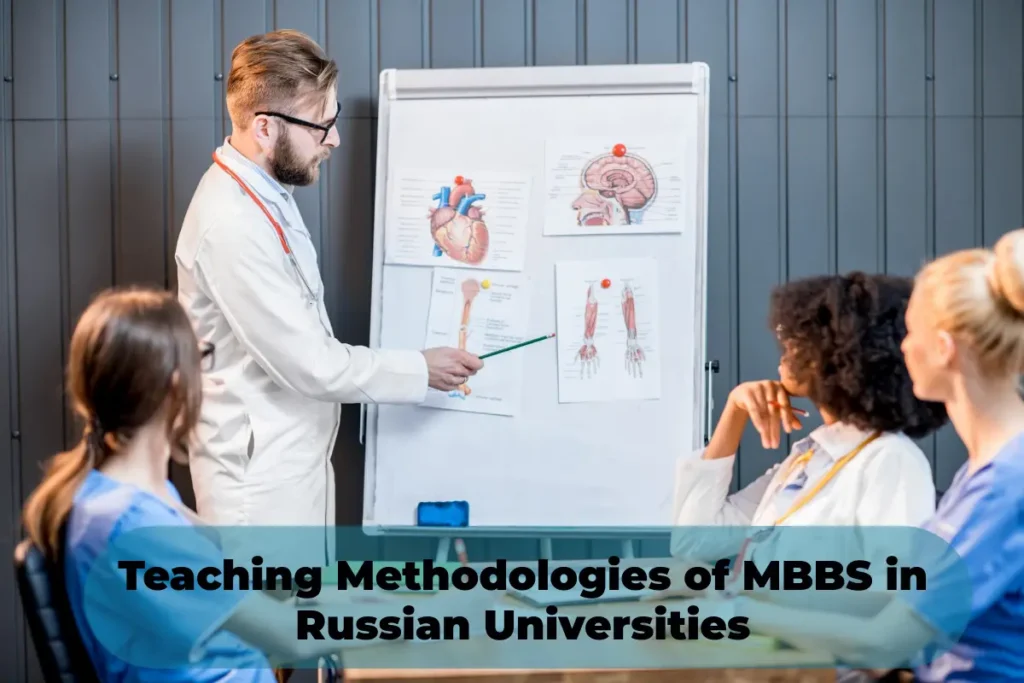Teaching Methodologies of MBBS in Russian Universities
Studying medicine is a dream for many aspiring doctors, and pursuing an MBBS degree in Russian universities has become an increasingly popular choice. Russian medical education has gained recognition worldwide for its high standards and affordable tuition fees. However, it is essential to understand the teaching methodologies employed by these universities before making a decision. This article provides an in-depth analysis of the teaching methodologies used in MBBS programs in Russian universities, helping prospective students make an informed choice for their medical education.
The curriculum of MBBS in Russian universities
The curriculum of MBBS in Russian universities designed to provide students with a comprehensive education in the field of medicine. The program follows a structured and rigorous curriculum that is in line with international standards.
The curriculum typically spans a duration of six years and divided into pre-clinical and clinical phases. During the pre-clinical phase, students introduced to the basic medical sciences such as anatomy, physiology, biochemistry, and pharmacology. These foundational subjects provide students with a strong understanding of the human body and its functions.
Once students have completed the pre-clinical phase, they transition into the clinical phase of their education. This phase focuses on developing practical skills and knowledge through hands-on training in hospitals and healthcare facilities. Students gain valuable experience in areas such as internal medicine, surgery, pediatrics, gynecology, and psychiatry, among others.
In addition to the core subjects, the curriculum also includes courses on medical ethics, healthcare policy, and research methodology. These courses aim to develop well-rounded and ethically aware medical professionals. Who prepared to address the complex challenges of modern healthcare.
Russian universities place a strong emphasis on practical training, and students given ample opportunities to apply the knowledge they have gained in real-life medical scenarios. This practical experience is critical in preparing students for their future careers as doctors.
Overall, the curriculum of MBBS in Russian universities designed to provide students with a comprehensive and well-rounded medical education. Graduates from these programs are equipped with the knowledge, skills, and experience necessary to excel in their careers and make a positive impact in the field of medicine.
Teaching methodologies employed in Russian medical schools
In Russian medical schools, a variety of teaching methodologies employed to ensure that students receive a comprehensive and well-rounded education. These methodologies carefully designed to provide students with the knowledge, skills, and competencies necessary to succeed in their medical careers. In this section, we will explore some of the key teaching methodologies used in Russian medical schools.
One of the primary methodologies used is lecture-based learning. Lectures are an integral part of the curriculum, where professors deliver in-depth and structured presentations on various medical topics. This allows students to grasp complex concepts and theories, while also providing them with the opportunity to engage with the material through active listening and note-taking.
Important Teaching Methodology
Another important teaching methodology utilized in Russian medical schools problem-based learning (PBL). PBL is a student-centered approach that encourages active learning and critical thinking. Students are presented with real-world medical cases and are tasked with analyzing and solving these cases in collaboration with their peers. This methodology promotes a deep understanding of the subject matter and enhances problem-solving abilities.
Laboratory-based learning also widely employed in Russian medical schools. Students have the opportunity to engage in hands-on practical sessions, where they can apply theoretical knowledge into practice. These laboratories equipped with state-of-the-art facilities and equipment, allowing students to develop important technical skills and gain practical experience in various medical procedures.
Furthermore, Russian medical schools place great emphasis on clinical training. This involves students actively participating in patient care under the supervision of experienced medical professionals. Clinical rotations in hospitals and medical centers provide students with the opportunity to observe and participate in real-world medical practices, enhancing their clinical skills and bedside manner.
Lastly, Russian medical schools also employ the use of modern technology in teaching methodologies. This includes the integration of e-learning platforms, virtual simulations, and multimedia resources. These technological tools enhance the learning experience by providing students with access to a vast array of educational materials, interactive lectures, and virtual patient scenarios.
Overall, the teaching methodologies employed in Russian medical schools aim to create a comprehensive and dynamic learning environment. By combining lectures, problem-based learning, laboratory sessions, clinical training, and modern technology. Students equipped with the necessary skills and knowledge to excel in their medical careers.
The advantages of studying MBBS in Russia
Studying MBBS in Russia offers numerous advantages for aspiring medical professionals. Russia is well-known for its high-quality education system and its prestigious medical universities.
Here are some key advantages of studying MBBS in Russia:
1. Reputation and Recognition: Russian medical universities are highly reputable and recognized globally. Many of them listed in international directories like the World Directory of Medical Schools and also recognized by organizations like the World Health Organization (WHO) and the Medical Council of India (MCI).
2. Affordable Tuition Fees: Compared to other countries offering MBBS programs, Russia is known for its relatively affordable tuition fees. This makes it a favorable destination for international students, especially for those who may have financial constraints.
3. English-Medium Programs: Several Russian medical universities offer MBBS programs in English, making it easier for international students to study and communicate effectively. This eliminates the need to learn Russian as a prerequisite for enrollment.
4. High-Quality Education: Russian medical universities are known for their excellent academic standards and rigorous training programs. They provide a comprehensive curriculum with a strong emphasis on practical exposure and hands-on training, allowing students to develop strong clinical skills.
5. Internationally Recognized Degree: Upon completion of their MBBS degree in Russia, graduates are awarded an internationally recognized degree. This opens doors to various career opportunities worldwide, as the qualification widely accepted and respected.
6. Cultural Diversity: Studying in Russia provides an opportunity for students to experience its rich cultural heritage and interact with students from different parts of the world. This fosters a diverse and multicultural learning environment that enhances personal growth and global understanding.
7. Research Opportunities: Russian medical universities emphasize research and encourage students to engage in scientific research projects. This provides students with valuable research experience and opportunities to contribute to advancing medical knowledge.
8. Affordable Cost of Living: In addition to affordable tuition fees, the cost of living in Russia is relatively lower compared to many other countries. Accommodation, food, and daily expenses reasonably priced, making it more manageable for international students.
9. Post-Graduation Opportunities: Upon completion of their MBBS degree, graduates have the option to pursue further specialization in Russia or return to their home country to practice medicine. Russian medical degrees widely recognized, allowing graduates to explore job opportunities globally.
10. Infrastructure and Facilities: Russian medical universities are equipped with state-of-the-art facilities, modern laboratories, and specialized hospitals. This ensures that students have access to the latest technology and resources required for their medical education and training.
Overall, studying MBBS in Russia offers a unique combination of quality education, affordability, international recognition, and cultural diversity. These advantages make it an attractive option for students aspiring to pursue a career in medicine.
Challenges and opportunities for international students in Russia
As an international student studying in Russia, you will encounter a unique set of challenges and opportunities. The challenges may include cultural differences, language barriers, and the need to adapt to a new educational system. However, with these challenges also come opportunities for personal growth, cultural enrichment, and academic excellence.
One of the main challenges you may face as an international student in Russia is the cultural difference. Russia has a rich cultural heritage, That may be quite different from what you accustomed to. It important to be open-minded and respectful of the local customs and traditions. By immersing yourself in the local culture, you can gain a deeper understanding of the country and its people.
Language barrier is another challenge that international students may face in Russia. Russian is the official language and while many universities offer programs in English, it is still beneficial to learn at least basic Russian. This will not only help you in your day-to-day interactions but also enable you to fully engage with the local community and make the most of your time in Russia.
Educational System in Russia
The educational system in Russia may also present challenges for international students. The teaching methods and expectations may differ from those in your home country. It important to be prepared to adapt to a new learning environment and to seek support when needed. Universities in Russia often provide resources such as language courses, tutors, and academic advisors to help international students succeed academically.
Despite the challenges, studying in Russia as an international student also offers numerous opportunities. Russia known for its rich cultural heritage, diverse landscapes, and vibrant arts scene. Take advantage of your time in Russia to explore and immerse yourself in the local culture. Engaging with the local community, participating in cultural events, and traveling within the country will not only enrich your experience but also broaden your horizons.
Moreover, studying in Russia can provide excellent academic opportunities. Russian universities renowned for their high-quality education in various fields such as science, technology, and the arts. By studying in Russia. You have the chance to learn from world-class professors. Access cutting-edge research facilities, and collaborate with fellow students from around the globe.
In conclusion, while there may be challenges to overcome, studying in Russia as an international student also presents numerous opportunities for personal and academic growth. By embracing the local culture, learning the language, and making the most of your educational experience, you can have a truly rewarding and enriching time in Russia.

